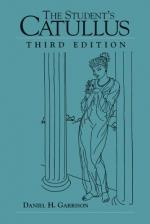|
This section contains 11,179 words (approx. 38 pages at 300 words per page) |

|
SOURCE: "The Miniature Epic, No. 64" and "Some Conclusions," in Catullus: A Reader's Guide to the Poems, University Press of America, 1983, pp. 135-52, 153-61.
Below, Small examines Catullus's most ambitious work, "Poem 64," and draws critical conclusions about the poet and his view of the role of poetry as a vehicle of self-expression, self-understanding, artistic immortality, and power "to celebrate whatever may merit praise …, to punish the wicked, to expose the inept, to defend the helpless and to retaliate upon the ungrateful."
No. "64" is Catullus' longest poem, perhaps his latest, certainly his most ambitious. It is an epyllion or short mythological epic. The epyllion was one of the more important literary innovations of the Hellenistic age. The genre was taken up and naturalized at Rome by the New Poets as part of their reaction against historical epic in the Ennian manner. We have already had occasion to mention in Chapter...
|
This section contains 11,179 words (approx. 38 pages at 300 words per page) |

|


